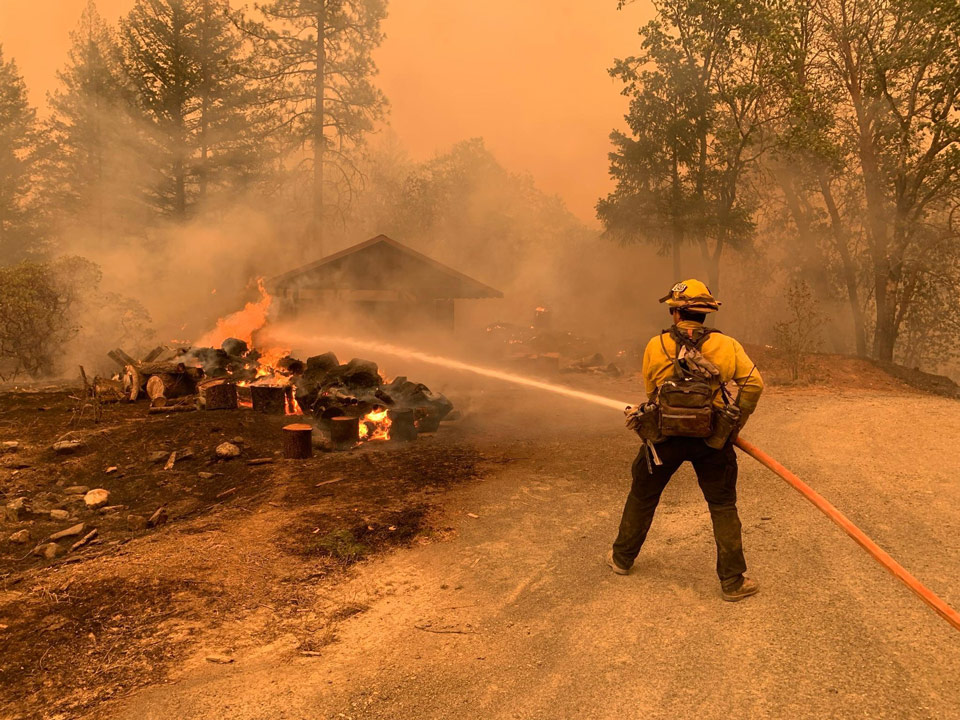
2021 California Monument Fire - Engine crew battles flames
Credit: USDA
November 3, 2021 - Washington - Senator Dianne Feinstein (D-Calif.) today applauded the Senate Homeland Security and Governmental Affairs Committee for voting to advance the Wildland Firefighter Fair Pay Act, a bill Feinstein introduced in January to lift the overtime pay cap that punishes federal wildland firefighters.
“The current overtime pay cap is a disincentive for many experienced firefighters to deploy to wildfire incidents later in the calendar year. Currently, the Forest Service estimates that up to 500 senior-level firefighters either stop taking wildfire assignments or do not request overtime pay for hours worked once they reach the pay cap,” Feinstein said in a statement for the record submitted during the markup.
Feinstein continued, “The bill, if enacted, would extend the pay cap waiver through 2022 and would require the Department of Interior and the Forest Service to submit a plan by March 30, 2022, that would address the need to hire and train additional wildland firefighters and modernize their compensation so sufficient firefighting resources are available without the need for waivers.”
During today’s markup, Senator Jacky Rosen (D-Nev.) amended the bill to include under the waiver the National Weather Service incident meteorologists who accompany federal wildland firefighters into the field to respond to wildfires.
Why the bill is necessary:
- Federal firefighters from the Departments of Interior and Agriculture are paid on the General Schedule (GS) pay scale based on seniority and performance. They make a base salary and are paid overtime when they exceed eight hours a day. However, there is an annual salary cap that limits how many overtime hours for which they can be paid.
- During wildfire season (typically toward the end of the year for California), many federally employed firefighters exceed the annual pay cap and receive no pay for additional overtime hours worked, while others are forced to pay back money they rightfully earned fighting wildfires.
- The current overtime pay cap serves as a disincentive for many experienced firefighters who would deploy to wildfire incidents, especially later in the fire season.
- The Forest Service estimates that up to 500 senior-level firefighters either stop participating or do not request pay for hours worked once they reach the pay cap. This has a significant effect on federal wildfire response capabilities.
The bill is supported by Grassroots Wildland Firefighters and the National Federation of Federal Employees.
Senator Feinstein’s full statement for the record follows:
“Thank you for the opportunity to provide a statement in support of my amendment to the Wildland Firefighter Fair Pay Act (S. 138).
My colleagues on this committee, Senator Padilla and Senator Rosen, have cosponsored this bill; and I would also like to thank Senator Padilla for introducing the amendment on my behalf. I very much appreciate the committee including this bill on the agenda today, as it will ensure that federal firefighters responding to wildfire emergencies receive pay for all the hours they work.
As this committee knows, western wildfires are becoming more frequent, more destructive, and more deadly as a result of climate change. The eight largest wildfires in California history have occurred since 2017. During that span, wildfire has burned 10 million acres throughout the State, killed nearly 200 people, and destroyed more than 32,000 homes.
At the same time, fire seasons are becoming longer, and as wildfires continue later into the year, many federally employed firefighters from the Departments of Interior and Agriculture are exceeding the annual pay cap. When that happens, these firefighters cannot receive overtime pay for additional hours worked. Those who are accidently paid for work above the cap are required to pay back the money they rightfully earned fighting wildfires.
The current overtime pay cap is a disincentive for many experienced firefighters to deploy to wildfire incidents later in the calendar year. Currently, the Forest Service estimates that up to 500 senior-level firefighters either stop taking wildfire assignments or do not request overtime pay for hours worked once they reach the pay cap.
These individuals are often critical members of incident management teams or people in specialized positions, such as fire analysts. They should be paid for the work that they do. Alternatively, their decision not to take further wildfire assignments based on concerns about the pay cap degrades our federal wildfire response capabilities. When there’s a wildfire burning in California, it is essential to have all hands on deck so that there is as little destruction to life and property as possible.
The bill, if enacted, would extend the pay cap waiver through 2022 and would require the Department of Interior and the Forest Service to submit a plan by March 30, 2022, that would address the need to hire and train additional wildland firefighters and modernize their compensation so sufficient firefighting resources are available without the need for waivers.
This bill moves us in the right direction – one that values the commitment of federal wildland firefighters and makes sure they are paid fairly for their service. I thank the Committee for its consideration and would be pleased to work with you to answer questions or address any concerns you may have. Thank you again for your consideration of the Wildland Firefighter Fair Pay Act.”
Source: Senator Dianne Feinstein
